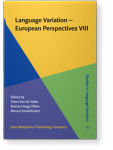Chapter 2
Is there an interlanguage speech acceptability deficit?
It may be assumed that non-native speakers (NNSs) of English are more accommodating towards other NNS accents, as a result of increased solidarity, intelligibility, or both. Emerging evidence suggests, however, that this is not true of all groups of NNSs, especially when judging those sharing the same L1. In an online survey we conducted among 67 Dutch and 45 French NNSs of English, we found that both groups of judges evaluated the speakers whose L1 they shared more negatively than any other accents. This does not only build on previous findings, but also suggests that communication among NNSs, instead of benefiting from an “intelligibility benefit”, may be affected by what we have termed an “acceptability deficit”.
Article outline
- 1.Introduction
- 2.Method
- 2.1Materials
- 2.2Structure and design of the survey
- 2.3Participants and procedure
- 3.Results
- 3.1Judges’ ability to identify matched and non-matched accents
- 3.2Evaluation of matched versus non-matched NNE accents
- 4.Discussion and conclusions
-
Acknowledgements
-
References
